
Relations between the European Union (EU) and the People's Republic of China (PRC) or Sino–European relations are bilateral relations that were established in 1975 between the PRC and the European Community. The EU is the PRC's largest trading partner, and the PRC is the EU's largest trade partner.

Everything but Arms (EBA) is an initiative of the European Union under which all imports to the EU from the least developed countries are duty-free and quota-free, with the exception of armaments. EBA entered into force on 5 March 2001. There were transitional arrangements for bananas, sugar and rice until January 2006, July 2009 and September 2009 respectively. The EBA is part of the EU Generalized System of Preferences (GSP). The up-to-date list of all countries benefiting from such preferential treatment is given in Annex IV of the consolidated text of Regulation (EU) 978/2012.
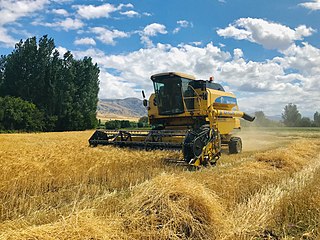
Agriculture is still an important sector of Turkey's economy, and the country is one of the world's top ten agricultural producers. Wheat, sugar beet, milk, poultry, cotton, vegetables and fruit are major products; and Turkey is the world's largest grower of hazelnuts, apricots, and oregano.

Poland–Ukraine relations revived on an international basis soon after Ukraine gained independence from the Soviet Union in 1991. Various controversies from the shared history of the two countries' peoples occasionally resurface in Polish–Ukrainian relations, but they tend not to have a major influence on the bilateral relations of Poland and Ukraine.
Rural Solidarity is a trade union of Polish farmers, established in late 1980 as part of the growing Solidarity movement. Its legalization became possible on February 19, 1981, when officials of the government of the People's Republic of Poland signed the so-called Rzeszów - Ustrzyki Dolne Agreement with striking farmers. Previously, Communist government had refused farmers’ right to self-organize, which caused widespread strikes, with the biggest wave taking place in January 1981. The Rural Solidarity was officially recognized on May 12, 1981, and, strongly backed by the Catholic Church of Poland, it claimed to represent at least half of Poland's 3.2 million smallholders.
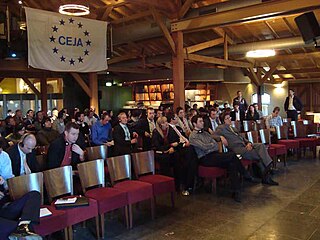
The Conseil Européen des Jeunes Agriculteurs (CEJA) is an umbrella organisation gathering young farmers from all over Europe and is one of the key advocates for the agricultural sector in Europe. This non-profit organisation currently has 33 member organisations from 22 EU member states and two observer members from non-EU countries, representing around two million young farmers. Its office is located in Brussels.
This is a list of crises situations and major protests in countries of Europe since the year 2000.
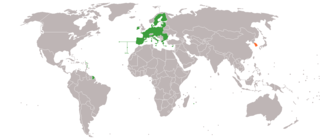
The European Union (EU) and South Korea are important trade partners: As of April 2023, Korea is the EU's third-largest importer. Excluding European countries, Korea has secured the third place on the list, following China and the United States. And the EU is Korea's third largest export destination. The two have signed a free trade agreement which came into effect at end of 2011. Furthermore, South Korea is the only country in the world with the three agreements covering economics, politics and security in effect as of 2020.

The Polish–Ukrainian border is the state border between Poland and Ukraine. It has a total length of 529 km (329 mi) to 535 km (332 mi).

Euractiv is a European news website focused on EU policies, founded in 1999 by the French media publisher Christophe Leclercq. Its headquarters and central editorial staff are located in Brussels, with other offices in Paris and Berlin. Its content is produced by about 50 journalists staffed in Belgium, Bulgaria, the Czech Republic, France, Germany, Greece, Italy, Poland, Romania, Serbia, and Slovakia.

Stéphane Séjourné is a French lawyer and politician of Renaissance who has been serving as Minister for Europe and Foreign Affairs in the government of Prime Minister Gabriel Attal since 2024.

Jérémy Decerle is a Charolais breeder, French politician and former trade unionist. He was president of the "Young Farmers" union from 2016 to 2019, before being elected Member of the European Parliament in 2019, on the list supported by Emmanuel Macron.
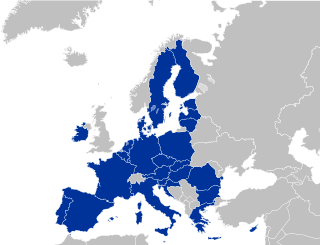
The European Union–Mercosur free trade agreement is a proposed free trade agreement on which the European Union and Mercosur reached agreement in principle in 2019. The planned deal was announced on 28 June at the 2019 G20 Osaka summit after twenty years of negotiations. The agreement is criticized by NGOs, scientists, unions, farmers and indigenous people.
Food and agriculture in Nazi Germany describes the food and agricultural policies of Nazi Germany and their consequences from 1933 when the Nazis took power in Germany until 1945 when Germany was defeated in World War II (1939–1945) by the allied nations. Starvation and its associated illnesses killed about 20 million people in Europe and Asia during World War II, approximately the same as the number of soldiers killed in battle. Most of the deaths from starvation in Europe were in the Soviet Union and Poland, countries invaded by Germany and occupied in whole or part during the war.
A global energy crisis began in the aftermath of the COVID-19 pandemic in 2021, with much of the globe facing shortages and increased prices in oil, gas and electricity markets. The crisis was caused by a variety of economic factors, including the rapid post-pandemic economic rebound that outpaced energy supply, and escalated into a widespread global energy crisis following the Russian invasion of Ukraine. The price of natural gas reached record highs, and as a result, so did electricity in some markets. Oil prices hit their highest level since 2008.
Events in the year 2024 in France.
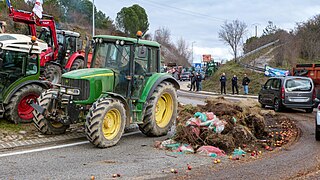
The 2024 French farmers' protests are a series of protests and road blockages organized mainly by agricultural unions since 18 January 2024. The farmers protested against low food prices, proposed reductions in state subsidies for farmers' diesel fuel, and a EU-Mercosur free trade agreement.

The Monument to John Cockerill is a group of statues erected in Brussels, Belgium, in memory of the Belgian-British industrialist John Cockerill, a pioneer of the steel industry and the railways in Belgium in the 19th century, as well as the industrial workers of Belgium.

Since November 2023, the border between Poland and Ukraine has been subject to regular blockades by Polish protesters. The blockade extended to all agricultural goods exported from Ukraine.
The 2024 Polish farmer protests are a series of ongoing protests and road blockages which occurred in early 2024 when Rural Solidarity, the largest farmers' union in Poland, called a strike to protest against the European Green Deal and continued grain imports from Ukraine.














